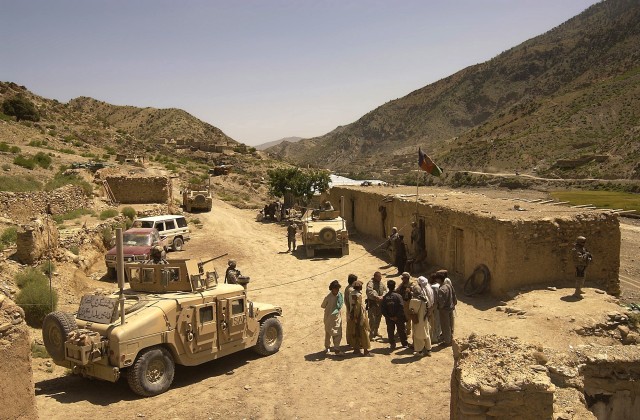WASHINGTON (American Forces Press Service, June 6, 2007) - Coalition forces have gained the upper hand against Taliban fighters in Afghanistan, the commander of NATO forces in the war-torn country told Pentagon reporters during a teleconference yesterday.
Four months into his second deployment to the country, Army Gen. Dan K. McNeill said the anticipated spring offensive by the Taliban has been headed off due to the larger number of troops under command of the International Security Assistance Force there.
"We made a decision early on that we would be out prosecuting our strategy, not waiting for the insurgent to prosecute his," Gen. McNeill said. "We felt fairly certain that because of the capability of our force that we would have the upper hand in at least maneuvering and shooting on the battlefield."
Although coalition forces have seen a slight increase in asymmetrical warfare -- such as with improvised explosive devices and suicide bombers -- since winter, it hasn't been to a level that is indicative of a true offensive, the general said.
In late February, when NATO forces predicted the increase, coalition forces worked with more intensity to ensure they could protect themselves against such attacks, he said.
In addition to providing security within the country, the International Security Assistance Force charter focuses on two other lines of effort: reconstruction and enabling governance.
"One piece that we hadn't figured prominently into this operation -- enabling governance -- has clearly come to the front," Gen. McNeill said. "It's made life a whole lot better for the governor of Helmand province."
The general said that Afghans within the province also are indicating that they want to be more involved in securing their own villages. Recently an Afghan tribe killed at least one Taliban leader and captured several more.
Gen. McNeill related that Afghan President Hamid Karzai, who had been in regular communication with residents, told him that the elders "were tired of living the way they were living and they wanted to get (the Taliban) out of their village."
"We look forward to trying to work along those lines -- Afghans taking more responsibility for their own security," Gen. McNeill said.
The largest reconstruction project since the rebuilding of the Ring Road, the 1,200-kilometer main highway between cities, is now under way, the general reported. Operation Achilles began in Helmand project in early March to refurbish a hydroelectric dam that presently 10 to 12 megawatts of electricity, much of which flows into Kandahar province.
The project, slated to be completed within two years, is anticipated to produce a steady state of 51 megawatts of electricity that will mostly flow into the Helmand province while creating nearly 2,500 jobs for Afghans.
<b>Opium Still a Problem</b>
The problems plaguing the Afghan government cannot be taken on without taking on the problem of poppy production, said Gen. McNeill.
Although he's not suggesting changing the charter of NATO's International Security Assistance Force in Afghanistan, Gen. McNeill said coalition forces can likely work within the eight pillars of the Afghan National Strategy for Counternarcotics to help fight against the opium cultivation in the country.
"Poppy is a defining characteristic for this country at present," Gen. McNeill said. "And it's a negative definition any way you look at it."
In years past, Afghans have had to turn to growing opium poppy largely due infrastructure problems such as poor roads and destroyed irrigation systems. Since poppies need moisture once every five days, the plant was heavily relied upon to provide an income for farmers in the drought-stricken country.
With increased moisture from the snow melt in the Hindu Kush Mountains this year and the best spring rain the country has received in more than 50 year, the general said prime conditions have been set for optimum narcotic cultivation.
"I don't think there's any doubt that there is some connection between the insurgency and poppy," Gen. McNeill said. He said that while monitoring of convoys for insurgents and munitions, coalition troops have frequently come across narcotics convoys.
"It occurs to me that when I put all this together, that is some places in Afghanistan, probably especially in the south, they're almost inextricable - what the insurgents are doing and what the 'narco' dealers are doing," he said.
The general said that he didn't have any numerical evidence to assign to the relationship, but he is convinced of the relationship. And the NATO force, he said, isn't designed to challenge the poppy trade militarily.
"Coalition troops are not an eradication force," he said. "We're not trained, we're not equipped, we don't have the requisite number of helicopters, and we're not manned to do it."
However, Gen. McNeill said that NATO forces will be able to work within the country's counternarcotics pillars to operate against the problem.
"I don't believe that we can deal with the insurgency in a complete fashion without taking on the issue of poppy," Gen. McNeill said.
<b>The Way Ahead</b>
Although the Karzai government has its challenges, Gen. McNeill said he believes it will continue to move forward and be successful.
Comparing the Afghan president to the manager of a baseball team, Gen. McNeill said Karzai must have a starting pitcher who can go nine innings.
"When President Karzai looks out on the bullpen, he doesn't have a lot of relievers or closers out there," Gen. McNeill said. "But I'm encouraged by what I have seen this time, relative to my first time when they had an interim government here. I think there is progress."


Social Sharing